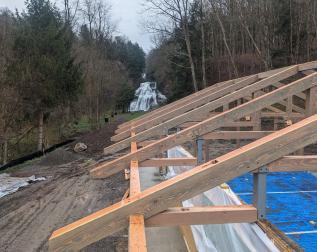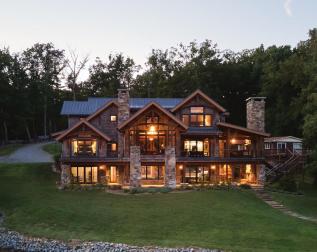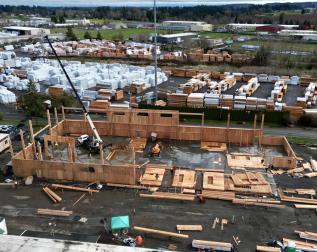For owners Doug Doetsch and his wife Susan Manning, their roots of apple farming in the Catskills Mountain Region of New York run deep. Doug has apple farming in his blood, tracing his ties to the area back five generations on both sides of his family including apple farms of the 1800’s, through prohibition era bootlegging of hard cider and applejack, to his own childhood growing up on orchards in the area. Apple farming is something of a Doetsch legacy.
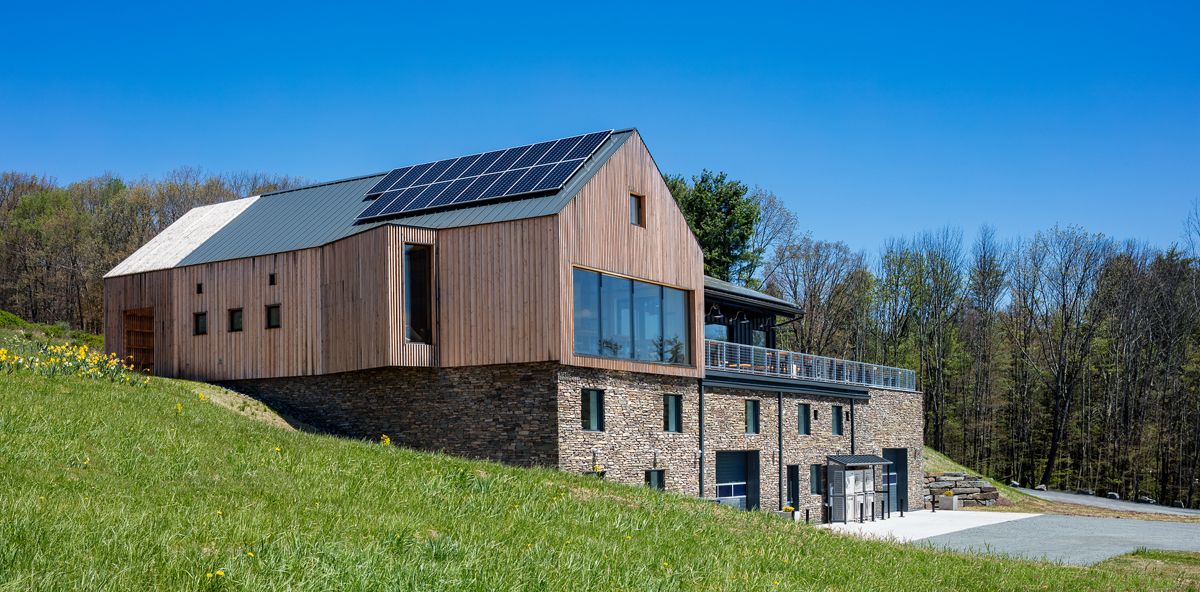
After moving away for thirty-or-so years to establish a career in international finance law, Doug returned to his roots and recently founded Seminary Hill, an organic orchard & cidery in Callicoon.
With the help of renowned orchardist Michael Philips and an expansive team of local like-minded folks, the Seminary Hill team started planning the holistic twelve acre orchard in 2012. It now includes more than 1,500 trees with an astonishing 60 varieties of American, English, and French heirloom apples and pears with plans to expand in the coming decade. The orchards ecosystem is based on the sympathetic planting of pollinating and pest-repellent plants and flowers so that the apples and pears can be grown without the use of chemical pesticides. Organic all the way.
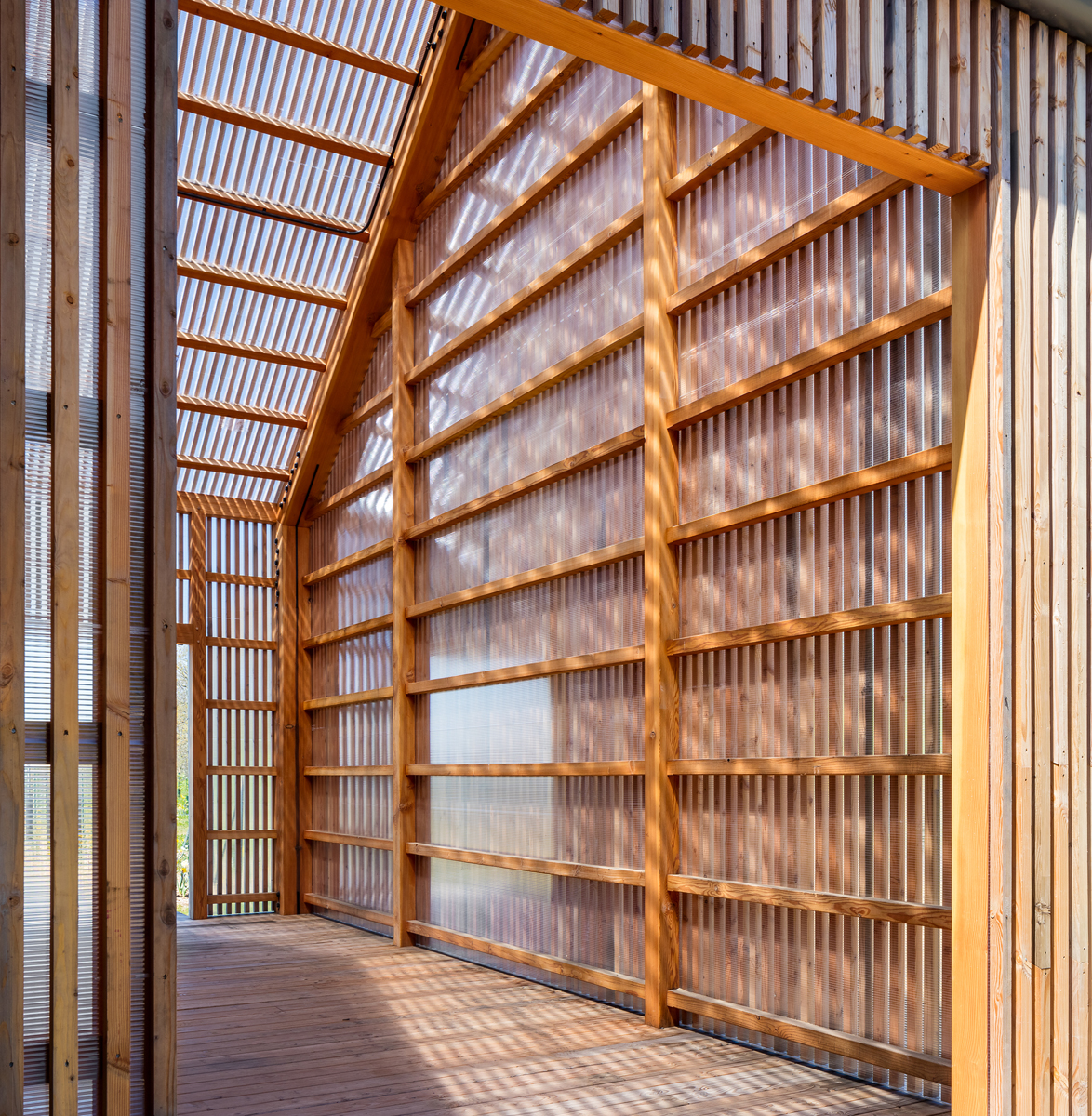
After the first few years of ecological development, the orchard needed a space for storing, processing, fermenting, and bottling cider. With River Architects as a partner, the team chose a spot overlooking the Delaware river-valley on the orchards grounds to build a cidery that would be the first Passive House certified building of its kind anywhere in the world. The ethos of sustainable and organic apple growing demanded an equally progressive processing facility.
“As we worked and developed the project together, the idea kept growing. It went from being just a small farm-to-table building to an aggressively marketed tasting and event venue with a full kitchen and a tent space to host weddings and other events,” said James Hartford of River Architects, the firm behind the cidery’s award winning design. “It was a natural setting for timber—having a masonry base for keeping the things that have to be moisture and temperature tolerant at the lower level, and the open airy spanning construction above.”

The construction process was a collaborative effort between River Architects, building company Baxter, and New Energy Works. Utilizing our heavy timber frame and high efficiency enclosure system to provide a basis for the passive design, the project also incorporated locally reclaimed wood elements, regional blue stone, and other equally sustainably minded materials to comprise the cidery and complement the cutting-edge overall design while keeping materials familiar to the surrounding area.
“The project is a certified Passive House, and it is the first of its kind in the world, beating out any other breweries, wineries or cideries in the world. That was a goal of ours,” James explained. “Recognizing that it is an organic orchard with an objective to tread very lightly on the land and do something positive rather than detrimental to the environment long term. Using materials that have less impact on the environment and carbon sequester, like heavy timbers, worked really well for our ethos.”

Beyond just the innovative concept to build a forward-thinking cidery, the aesthetic of the structure had another goal at heart—to bring the agricultural heritage of barn-styled buildings in the region into a modern and sustainable context.
“The design is largely based on a banked barn concept where the two different elevations are used for different purposes,” James shared. “Traditionally the bottom would be for livestock on the ground floor and things like hay wagons would be on the upper level. This same design worked for making cider with the wet fermentation process in the lower level, and the airy, light-filled space above ideal for public gathering and events. One of the things that I really pushed hard for was keeping the vision of this project to be a modern take on the traditional banked barn. I grew up in the Hudson Valley, and we had such beautiful barns that are now mostly gone from the region. To bring back that heritage and to do an update on it was really rewarding.”

The hamlet of Callicoon where the cidery is located, takes its name from Dutch hunters traveling west from the Hudson Valley in the 1600’s. The hunters found an abundance of wild turkey in the region, marking the area on their maps as “Kollikoonkill,” meaning “Wild Turkey Creek”. Seminary Hill borrows from this legacy with their iconic octagon logo which incorporates an illustration of a turkey in the design. There was once an actual seminary located on one of the hills of the orchards complex, which gives the cidery its name.

The Callicoon area was once a notable getaway destination with resorts that proliferated in the Catskills during the mid 1900’s. An easily accessible haven from life in New York City drew many Jewish-American and Easter European-American travelers to the area for decades, but the advent of affordable flights in the late 1960’s that began taking vacationers to more exotic destinations, the hospitality industry in the area fell on hard times. Helping to revitalize the area and provide a solution to the socio-economic problems faced by the region were a driving factors in the creation of Seminary Hill.
“The Doug & Susan recognized the challenges of rural America; they are really trying to stimulate the economy in this area by employing local people,” James explained. “The impact of this project has been large. Not only are they employing people who are working on the orchard, making cider, or working on events, but they have also purchased and renovated buildings, like the former community hospital, which is now a hotel/ boarding house that accommodates guests attending events at the cidery.”

Seminary Hill purchases local ingredients in their kitchens, which serve a local and seasonal menu in their tasting room and cater large events at the cidery, such as weddings.
“The interaction the cidery has with the rest of the agricultural economy in the area is great,” James told us. “The produce that Seminary Hill uses in their kitchens come from farms in the area whenever possible. It has had a really positive effect on the resurgence of agriculture in the region.”

With plans to expand their output and distribution of cider in the coming decade, Seminary Hill plans to keep investing in the local community. With the hope to eventually host art exhibitions, seminars on cider making & orchard planting, workshops for environmental activists and architects, the real impact on the community has just begun. The long-term goal is that Seminary Hill continue to set a good example of responsible, sustainable business practices that can enrich a rural area and provide stable economic improvements while treading lightly on the planet in the process.
“Creating a building that is responsible and that works responsibly with the overall environment is important. It is really easy for people to talk about being sustainable, but to walk it is a different thing altogether,” James surmised. “I hope that the building stands as a reference point for others to really think about how they can create better architecture and make better material choices for structures that will be part of the landscape for generations.”
For more please visit: Seminary Hill Orchard & Cidery







